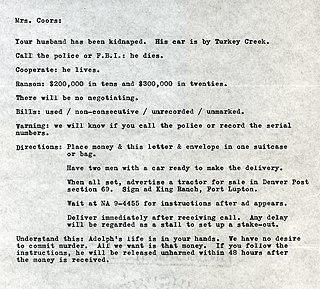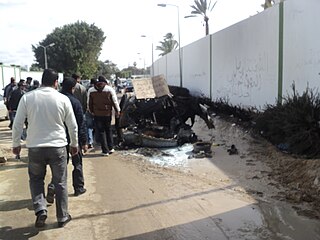Related Research Articles
Ibn al-Shaykh al-Libi was a Libyan national captured in Afghanistan in November 2001 after the fall of the Taliban; he was interrogated by American and Egyptian forces. The information he gave under torture to Egyptian authorities was cited by the George W. Bush administration in the months preceding its 2003 invasion of Iraq as evidence of a connection between Saddam Hussein and al-Qaeda. That information was frequently repeated by members of the Bush administration, although reports from both the Central Intelligence Agency (CIA) and the Defense Intelligence Agency (DIA) strongly questioned its credibility, suggesting that al-Libi was "intentionally misleading" interrogators.

Muammar Muhammad Abu Minyar al-Gaddafi was a Libyan revolutionary, politician and political theorist who ruled Libya from 1969 until his assassination by rebel forces in 2011. He first served as Revolutionary Chairman of the Libyan Arab Republic from 1969 to 1977 and then as the Brotherly Leader of the Great Socialist People's Libyan Arab Jamahiriya from 1977 to 2011. Initially ideologically committed to Arab nationalism and Arab socialism, Gaddafi later ruled according to his own Third International Theory.
Al-Saadi Muammar Gaddafi, also spelt as Al-Saadi Moammer Al-Gaddafi, is a Libyan retired professional football player. He captained the national team, but his career was widely attributed to the influence of his father Muammar Gaddafi, the country's leader at the time.
Nazih Abdul-Hamed Nabih al-Ruqai'i, known by the alias Abu Anas al-Libi, was a Libyan under indictment in the United States for his part in the 1998 United States embassy bombings. He worked as a computer specialist for al-Qaeda. He was an ethnic Libyan, born in Tripoli.

Extraordinary rendition is a euphemism for state-sponsored kidnapping in another jurisdiction and transfer to a third state. The phrase usually refers to a United States-led program used during the War on Terror, which had the purpose of circumventing the source country's laws on interrogation, detention, extradition and/or torture. Extraordinary rendition is a type of extraterritorial abduction, but not all extraterritorial abductions include transfer to a third country.

Human rights in Libya is the record of human rights upheld and violated in various stages of Libya's history. The Kingdom of Libya, from 1951 to 1969, was heavily influenced and educated by the British and Y.R.K companies. Under the King, Libya had a constitution. The kingdom, however, was marked by a feudal regime. Due to the previous colonial regime, Libya had a low literacy rate of 10%, a low life expectancy of 57 years, with many people living in shanties and tents. Illiteracy and homelessness were chronic problems during this era, when iron shacks dotted many urban centres on the country.

Muammar Gaddafi became the de facto leader of Libya on 1 September 1969 after leading a group of young Libyan Army officers against King Idris I in a bloodless coup d'état. After the king had fled the country, the Revolutionary Command Council (RCC) headed by Gaddafi abolished the monarchy and the old constitution and established the Libyan Arab Republic, with the motto "freedom, socialism and unity". The name of Libya was changed several times during Gaddafi's tenure as leader. From 1969 to 1977, the name was the Libyan Arab Republic. In 1977, the name was changed to Socialist People's Libyan Arab Jamahiriya. Jamahiriya was a term coined by Gaddafi, usually translated as "state of the masses". The country was renamed again in 1986 as the Great Socialist People's Libyan Arab Jamahiriya, after the United States bombing that year.
Human rights in Egypt are guaranteed by the Constitution of the Arab Republic of Egypt under the various articles of Chapter 3. The country is also a party to numerous international human rights treaties, including the International Covenant on Civil and Political Rights and the International Covenant on Economic, Social and Cultural Rights. However, the state of human rights in the country has been criticized both in the past and the present, especially by foreign human rights organisations such as Amnesty International and Human Rights Watch. As of 2022, Human Rights Watch has declared that Egypt's human rights crises under the government of President Abdel Fattah al-Sisi, is "one of its worst ... in many decades", and that "tens of thousands of government critics, including journalists, peaceful activists, and human rights defenders, remain imprisoned on abusive 'terrorism' charges, many in lengthy pretrial detention." International human rights organizations, such as the aforementioned HRW and Amnesty International, have alleged that as of January 2020, there are some 60,000 political prisoners in Egypt. Other complaints made are of authorities harassing and detaining "relatives of dissidents abroad" and use of "vague 'morality' charges to prosecute LGBT people, female social media influencers, and survivors of sexual violence". The Egyptian government has frequently rejected such criticism, denying that any of the prisoners it holds are political prisoners.

The National Front for the Salvation of Libya (NFSL) was a political opposition group active during the rule of the Gaddafi regime in Libya. It was formed in 1981 and called for major liberalising reforms such as democratic elections, a free press, and the separation of powers. During the 1980s, it pursued a campaign of armed opposition to the Gaddafi regime and made several coup attempts, the most notable being its 1984 armed assault on Gaddafi's Bab al-Azizia compound in Tripoli. After the failure of this and several other coup attempts the group largely abandoned militancy, and instead used peaceful tactics to promote reform in Libya; in 2005, the NFSL joined with six other groups to form the National Conference for the Libyan Opposition.
Mansour Rashid Kikhia was the Libyan Minister of Foreign Affairs (1972–1973), Libyan Ambassador to the United Nations, Permanent Libyan Representative to the United Nations (1975–1980), and later an opposition figure to Libya's leader Muammar Gaddafi, and human rights activist.
Ashraf Ahmad Al-Hajuj is a Palestinian-Bulgarian medic who was the principal defendant in the HIV trial in Libya. Born in 1969, in 1972 he and his parents moved from Egypt to Libya, where his father was working as a senior teacher of mathematics. Al-Hajuj grew up and studied in Libya. He was in the last month of his internship when he was arrested and accused of infecting more than 400 children with HIV. The co-accused were five Bulgarian nurses.

The Libyan civil war or the 2011 Libyan revolution, also known as the First Libyan Civil War was an armed conflict in 2011 in the North African country of Libya that was fought between forces loyal to Colonel Muammar Gaddafi and rebel groups that were seeking to oust his government. The war was preceded by protests in Zawiya on 8 August 2009 and finally ignited by protests in Benghazi beginning on Tuesday, 15 February 2011, which led to clashes with security forces who fired on the crowd. The protests escalated into a rebellion that spread across the country, with the forces opposing Gaddafi establishing an interim governing body, the National Transitional Council.

Abu Salim prison is a maximum security prison in Tripoli, Libya. The prison was notorious during the rule of Muammar Gaddafi for alleged mistreatment and human rights abuses, including a massacre in 1996 in which Human Rights Watch estimated that 1,270 prisoners were killed.

Abdul Fatah Younis Al-Obeidi was a senior Libyan military officer. He held the rank of major general and the post of minister of interior, but resigned on 22 February 2011 and defected to the rebel side in the First Libyan Civil War. He was considered a key supporter of Muammar Gaddafi or even No. 2 in the Libyan government.

United Nations Security Council Resolution 1970 was a measure adopted unanimously by the UN Security Council on 26 February 2011. It condemned the use of lethal force by the government of Muammar Gaddafi against protesters participating in the Libyan Civil War, and imposed a series of international sanctions in response.
Iman al-Obeidi is a former Libyan postgraduate law student who received worldwide media attention during the Libyan Civil War. This was because she burst into the restaurant of the Rixos Hotel in Tripoli and told the international press corps there that Libyan troops had beaten and gang-raped her. Her public statement challenged both the Gaddafi government and the taboo against discussing sex crimes in Libya.
Abdelhakim Belhaj is a Libyan politician and military leader. He is the leader of the Islamist al-Watan Party and former head of the Tripoli Military Council. He was the emir of the defunct Libyan Islamic Fighting Group, an anti-Gaddafi guerrilla group.

The Islamic State – Libya Province is a militant Islamist group active in Libya under three branches: Fezzan Province in the desert south, Cyrenaica Province in the east, and Tripolitania Province in the west. The branches were formed on 13 November 2014, following pledges of allegiance to IS leader Abu Bakr al-Baghdadi by militants in Libya.

Hisham Ben Ghalbon is a founding member and spokesman for Libyan Constitutional Union (LCU) and was an opponent of the regime of Libyan leader Muammar Gaddafi since the mid 1970s when Ben Ghalbon was a student at the faculty of Engineering in the University of Tripoli.
Seham Sergiwa is a Libyan psychologist elected to the Libyan parliament in 2014. She was abducted by a Libyan National Army militia loyal to Khalifa Haftar on 17 July 2019. The United Nations Support Mission in Libya expressed its deep concern and stated that "silencing the voices of women in decision-making positions [would] not be tolerated." As of 17 October 2019, Sergiwa's location was unknown and the "authorities in eastern Libya" had not published the results of any investigation.
References
- ↑ "Press Releases | Amnesty International UK". Archived from the original on 2013-10-03. Retrieved 2017-10-29.
- ↑ "Truth and Justice Can't Wait". Human Rights Watch. 12 December 2009. Archived from the original on 6 October 2012. Retrieved 4 December 2016.
- ↑ GOLDMAN, RUSSELL \; KIRIT RADIA (2009-09-22). "Did Trump Unwittingly Rent Land to Gaddafi?". ABC News. Archived from the original on 2016-03-04. Retrieved 9 April 2011.
- ↑ "Best Immigration Lawyer, Attorneys in NYC, New York - Wildes & Weinberg, P.C". Wildesweinberg.com. Archived from the original on 2017-05-02. Retrieved 2022-01-01.
- ↑ "Enforced disappearance of Izzat Al-Maqrif in 1990". Archived from the original on 2017-10-18. Retrieved 2017-09-27.